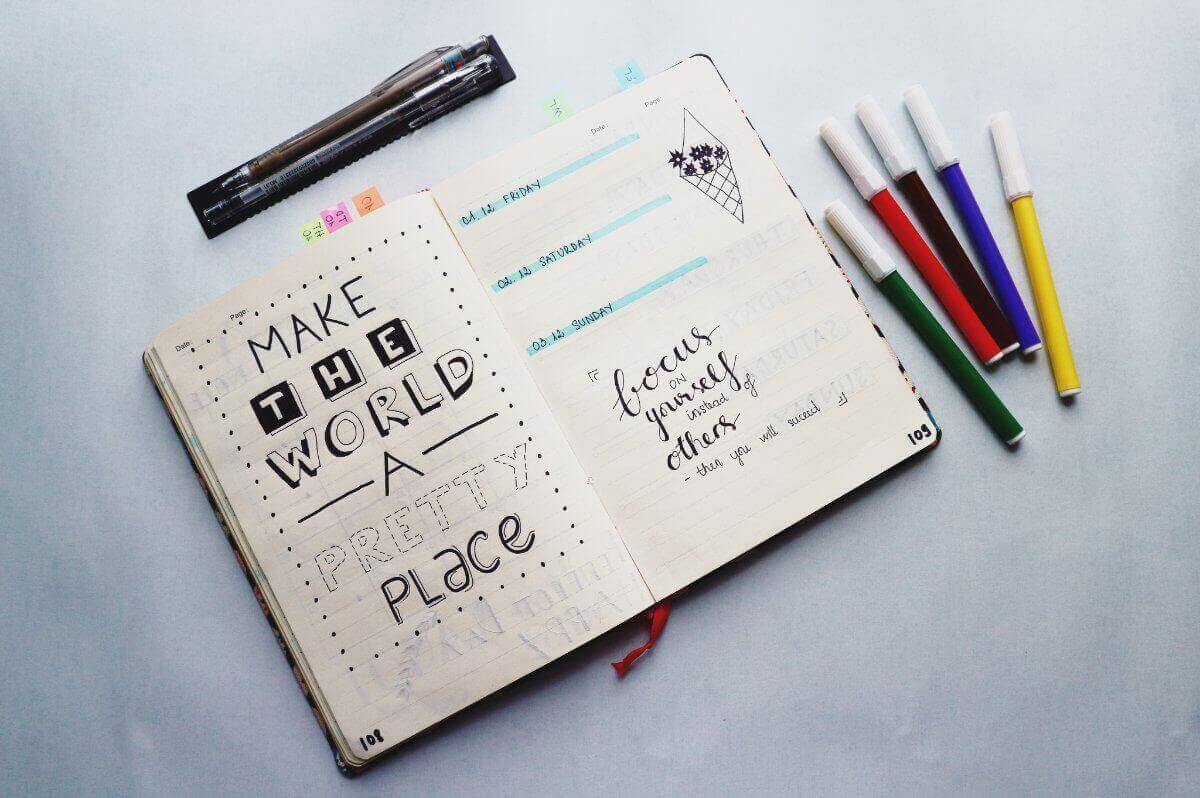Are you eager to boost your personal growth and achieve your goals? The secret might be simpler than you think: habit tracking. This straightforward practice can be a game-changer, helping you to become the best version of yourself.
Habit tracking is like a mirror to your daily routines. It helps you see clearly what you’re doing right, where you’re going wrong, and what needs to change. It’s a powerful tool for personal development, and it’s all in your hands.
This article will explore some good habits to track and how doing so can transform your life. Get ready to embark on a journey of self-improvement and personal growth!
Table of Contents
Why Is Habit Tracking Important?
Habit tracking isn’t merely a trending buzzword; it’s a powerful tool for personal transformation. By keeping a record of our daily actions, we gain insight into our behavior patterns. This awareness is the first step towards making positive changes in our lives.
Imagine you’re on a journey. Without a map or a compass, it’s easy to lose your way. Similarly, without tracking your habits, it’s hard to know if you’re making progress toward your goals or moving away from them.
What’s more, tracking good habits can be a catalyst for positive life transformations. It’s not just about ticking off completed tasks; it’s about building a better version of yourself, one habit at a time.
The Benefits of Habit Tracking
Renowned author James Clear, in his best-selling book “Atomic Habits,” emphasizes the transformative power of habit tracking. He argues that tracking our habits is not about achieving perfection but about recognizing patterns, celebrating progress, and making adjustments when necessary.
Habit Tracking Reminds You To Take Action
One of the best things about a habit tracker is that it serves as a constant visual reminder of your goals. Every time you see your tracker, you’re reminded of the actions you need to take to reach your objectives. It’s like having a personal coach nudging you to stay on track.
Moreover, habit tracking can provide clarity about your actions and behaviors. By keeping a record of your habits, you can gain a better understanding of what’s working for you and what’s not, thereby allowing you to adjust your strategies accordingly.
Habit Tracking Keeps You on Course
Recognition of progress is a powerful motivator. When you see your accomplishments visually represented in a habit tracker, it can boost your motivation to keep going. Each tick, cross, or color-filled box is a testament to your commitment and perseverance.
During challenging times, a glance at your habit tracker can be a source of encouragement. It can serve as a reminder of the progress you’ve made and the resilience you’ve shown, inspiring you to continue your journey towards personal growth.

Habit Tracking Is Rewarding
There’s something inherently satisfying about marking off a completed task. This immediate gratification can make habit tracking a rewarding experience in itself. It’s not just about reaching the end goal; it’s about enjoying the journey and celebrating each small victory along the way.
By focusing on the process rather than the outcome, habit tracking encourages you to appreciate the present moment and find joy in the act of doing. It’s a powerful tool that can transform your life, one tick at a time.
What Habits Should You Track?
Deciding what habits to track is a highly personal process. The habits you choose should align with your goals, values, and lifestyle. Here are some methods to identify potential habits for tracking:
- Goal-oriented: Identify habits that directly contribute to your long-term goals. If you’re aiming for financial freedom, for example, you might track your spending or saving habits.
- Health-focused: If your goal is to improve your health, you might track your eating habits, exercise routine, or sleep patterns.
- Personal growth: You could track habits like reading, journaling, or learning a new skill to foster personal development.
The key to successful habit tracking is consistency. Choose habits that you can realistically incorporate into your daily routine. It’s also better to start small and build up than to set unrealistic expectations and get discouraged.
How To Track Habits?
There are various ways to track habits, and the best method depends on your personal preferences and lifestyle. Here are a few options:
- Apps: There are numerous habit-tracking apps like Habitica and Way of Life that offer features like reminders, progress charts, and community support.
- Journal: A traditional pen-and-paper approach can be therapeutic and offers flexibility in how you record your habits.
- Spreadsheets: If you love data, a spreadsheet might be the way to go. You can create custom formulas to analyze your progress.
You can track daily, weekly, or monthly habits, or habits in different life categories like:
- Physical health
- Mental health
- Spiritual health
- Financial habits
- Habits related to your home
- Fitness habits
- Work habits
- Habits related to relationships, etc.
The key is to find a tracking method that works for you. And remember, habit tracking isn’t about perfection. It’s about progress. Even small steps, when consistently taken, can lead to significant changes over time.
So, What Are Good Habits To Track?
Now that we understand the importance of habit tracking, let’s look at examples of habits you could track.
Daily Habits
Daily habits are small actions we do every day that contribute to our overall well-being and productivity. Here are examples of good daily habits to track:
- Drinking at least 8 glasses of water
- Eating 3 meals per day
- Meditating for 15 minutes
- Reading for 30 minutes
- Walking or exercising for 30 minutes
- Getting 7-8 hours of sleep
- Practicing gratitude
- Completing a work task without distractions
- Tracking daily expenses
- Cleaning one area of your home
- Spending quality time with loved ones
- Practicing a hobby or skill for 30 minutes
- Limiting social media use to 30 minutes per day
- Writing in a journal
- Practicing deep breathing exercises
- Reviewing and planning the next day
- Listening to an educational podcast
- Practicing positive affirmations
- Learning something new
- Practicing mindfulness
Good Weekly Habits To Track
Weekly habits might be a little more time-consuming or task-oriented. These are habits you can aim to do once a week:
- Planning your weekly meals
- Doing a full-body workout
- Deep cleaning your home
- Reviewing your weekly expenses
- Setting weekly goals
- Having a social media-free day
- Doing a self-care routine
- Checking in with a friend or family member
- Updating your to-do list and calendar for the next week
- Reflecting on the week’s achievements

Monthly Habits
Monthly habits often involve bigger tasks or reviews of your progress. Here are some examples of monthly habits to track:
- Setting monthly goals
- Reviewing the past month’s expenses
- Doing a monthly health check-up
- Decluttering your home
- Reading a new book
- Trying a new hobby or skill
- Having a date night or social gathering
- Reviewing and updating your financial investments
- Planning a day trip or adventure
- Reflecting on and celebrating the month’s achievements
Physical Health Habits
- Eating 5 servings of fruits and vegetables
- Drinking 6-8 glasses of water per day
- Getting at least 7 hours of sleep
- Flossing twice per day
- Limiting alcohol intake
- 0-cigarette days
Mental Health Habits
- Practicing mindfulness every day
- Taking mental health days
- Limiting screen time in the evening
- Reading at least one chapter every day
- Engaging in a hobby at least once per week
Spiritual Health Habits
- Meditating daily
- Practicing gratitude in the morning
- Spending time in nature at least once a month
- Attending spiritual gatherings every month
- Practicing yoga for 15 minutes every day
- Reading spiritual texts
Financial Habits
- Saving a set percentage of your income every month
- Investing a set sum regularly
- Sticking to your monthly budget
- Day of no spending
- Putting $5 in your traveling fund
Home Habits
- Cleaning your home every week
- Making your bed every morning
- Throwing out things you don’t use every month
- Watering plants
- Filing papers
- Sorting mail once per week
Fitness Habits
- Exercising for 20 minutes every day
- Stretching before and after workouts
- Trying one new fitness activity every quarter
- Eating protein-rich foods with each meal
- Taking 5 active breaks throughout the day
- Tracking your fitness progress (for example, your heart rate during your morning run)
Work Habits
- Writing one blog or social media post per day
- Taking 1 mindful break per day
- Zero inbox day
- Learning something new every day
- One hour of focused work
- Networking with someone new each week
Relationship Habits
- Call or text a family member every week
- Weekly date night
- Spending 30 min of quality time with a neighbor
- Read 20 minutes to your kids each night
The key to successful habit tracking isn’t just about the habits you choose to track but your consistency in tracking them. Choose habits that align with your goals and values, and start your journey toward personal growth.

Making Tracking Habits a Habit
While the benefits of habit tracking are clear, it’s not always easy to make this practice a part of your daily routine. Many people face challenges and misconceptions that can deter them from sticking to their habit-tracking goals.
One common misconception is the idea that habit tracking is time-consuming. In reality, it only takes a few minutes each day. The key is to make it a part of your routine, perhaps by tracking your habits first thing in the morning or last thing at night.
Another challenge is knowing which habits to track. It’s easy to become overwhelmed if you try to track too many habits at once. Start small by focusing on one or two key habits that align with your goals. As you become more comfortable with the process, you can gradually add more habits to your tracking list.
How To Make Habits Stick
Creating a new habit isn’t just about repetition; it’s about creating a system that makes it easy to maintain the habit over the long term. Here are a few strategies that can help.
Firstly, make your habit specific and measurable. Instead of saying, “I want to exercise more,” say, “I will go for a 30-minute jog every morning.” This gives you a clear, tangible goal to aim for.
Secondly, consistency is key. It’s better to do a little bit every day than to do a lot once in a while. This helps to reinforce the habit and make it a normal part of your routine.
Lastly, be patient with yourself. Research suggests it takes an average of 66 days to form a new habit. Don’t be discouraged if you don’t see immediate results. Keep at it, and over time, you’ll start to see the benefits.
Final Tips for Tracking Habits
Having explored the importance of habit tracking and some beneficial habits to track, let’s conclude with some final tips to help you on your habit-tracking journey.
It’s Okay To Miss a Day
No one is perfect, and it’s crucial to remember this as you embark on your habit-tracking journey.
There will be days when you miss a task or forget to track a habit. Instead of beating yourself up about it, use it as an opportunity to learn and grow.
If you find a certain habit particularly challenging to maintain, try to understand why. Is it too time-consuming? Is it not enjoyable? Use this insight to adjust your approach and make the habit more manageable or enjoyable.
Habit Tracking Doesn’t Work the Same for Everyone
Just as each person is unique, so too is the process of habit tracking. What works for one person may not work for another.
Some people may thrive on tracking numerous habits at once, while others may find success in focusing on one or two key habits. Similarly, the method of tracking can vary from person to person.
While some may prefer a digital tracker, others may find a physical journal more satisfying. The key is to find a method that aligns with your personal preferences and challenges. Experiment with different strategies until you find one that feels right for you.
Ultimately, habit tracking is a journey of self-discovery and personal growth. By cultivating positive habits and consistently tracking them, you’re laying the foundation for a more productive, fulfilling life.
Make Sure You Don’t Overwhelm Yourself
It’s crucial to remember that habit tracking is a tool to enhance personal growth, not a means to stress yourself out, so you need to set achievable targets.
Yes, you might be eager to transform your life overnight, but habit-building (and tracking) is a gradual process. It’s about making small, consistent changes that add up to big results over time.
Start with just a few habits that you want to track. These could be simple things like drinking more water, getting up earlier, or spending less time on social media. Once you’ve successfully incorporated these habits into your daily routine, you can gradually add more.
Also, remember to be patient with yourself. Changing habits isn’t easy, and there might be days when you slip up. That’s perfectly okay. The key is not to get discouraged but to get back on track as soon as possible.
Keep Habit Tracking Fun
Who says habit tracking has to be dull? In fact, the more enjoyable you make it, the more likely you are to stick with it. One way to do this is by getting creative with your habit tracker.
Instead of just making a checklist, why not turn it into a visual masterpiece? You could use different colors for different habits, add stickers or doodles, or even create a habit-tracking wall in your home. The possibilities are endless!
Visualization can be a powerful tool in habit tracking. By visualizing your success, you’re more likely to achieve it. So, as you mark off each day on your habit tracker, take a moment to visualize how these habits are bringing you closer to your goals.
Conclusion
Habit tracking is a potent catalyst for personal transformation. By meticulously monitoring our daily actions, we gain a deeper understanding of our behavior patterns. This awareness is the springboard for making positive changes and propelling us towards our goals.
Whether you’re aiming for improved physical health, financial freedom, or personal development, consistent habit tracking can be a significant game-changer.
But remember, the key is to start small, keep it fun, and focus on consistency. It’s not just about ticking off completed tasks; it’s about building a better version of yourself, one habit at a time.





